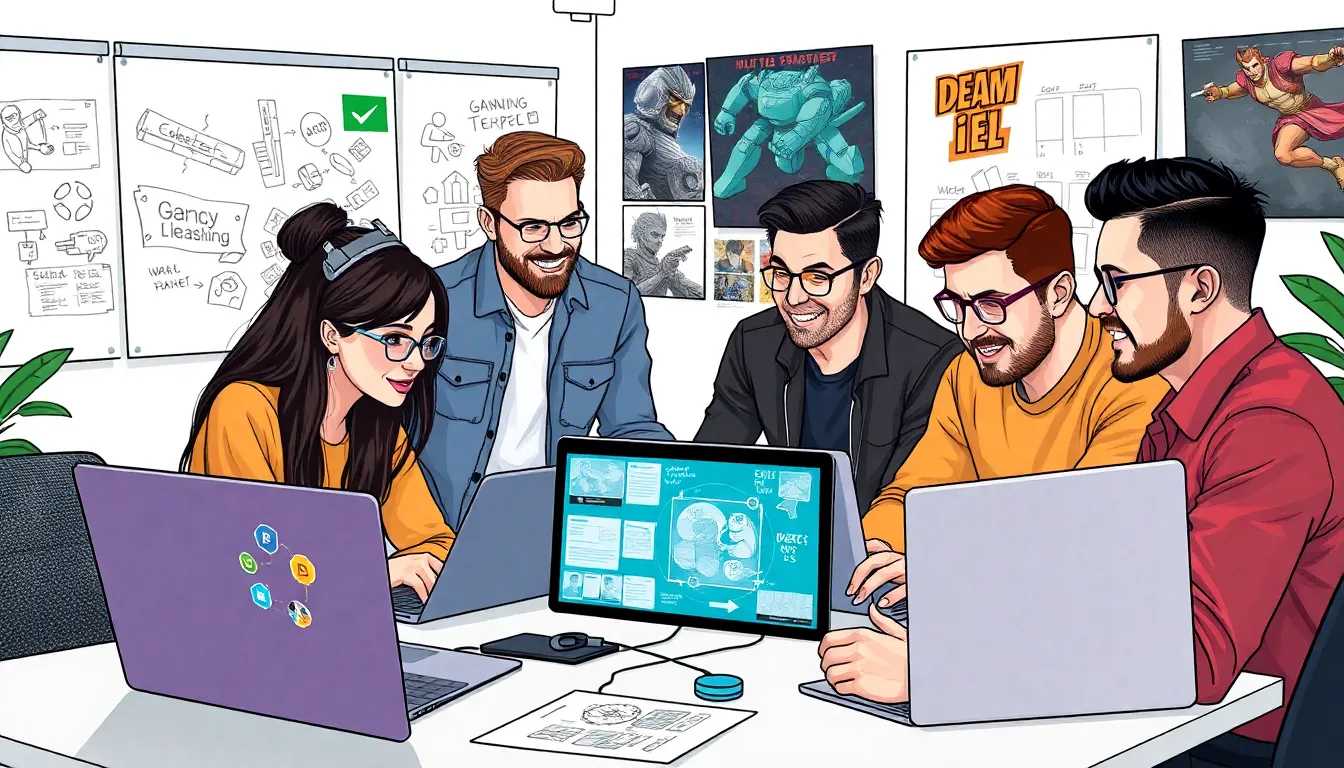In the fast-paced world of game development, every pixel counts and every second matters. As studios strive to create the next big hit, many are discovering that outsourcing can be their secret weapon. Imagine having a talented team of developers at your fingertips, ready to tackle everything from coding to art design while you sip coffee and brainstorm your next blockbuster.
Overview of Game Development Outsourcing
Game development outsourcing provides studios with the opportunity to collaborate with specialized teams around the world. Access to skill sets in various fields such as coding, art design, sound engineering, and quality assurance enhances overall project quality. Developers can focus on core tasks while relying on external teams for additional resources.
Cost efficiency forms a significant advantage of outsourcing. By partnering with companies in regions with lower labor costs, studios save on overhead expenses. This model enables studios to allocate funds strategically, investing in essential areas like marketing and user acquisition.
Outsourcing also promotes flexibility within development timelines. External teams can scale up or down based on project demands, ensuring studios can meet tight deadlines without sacrificing quality. When studios tap into talent on different schedules, they can maintain productivity around the clock.
Collaboration tools and communication platforms streamline the outsourcing process. Video conferencing, project management software, and file-sharing services establish effective channels for feedback and coordination. Clear communication and defined expectations help ensure that projects stay aligned with the studio’s vision.
However, challenges exist. Maintaining quality control requires diligent oversight. Establishing clear contracts and regular check-ins mitigates misunderstandings. Investing time in building relationships with outsourced teams fosters trust, ensuring smooth collaboration.
Game development outsourcing serves as an effective strategy for studios seeking to expand their capabilities. Through careful selection of partners and manageable oversight, studios can leverage this model to create engaging and high-quality games.
Benefits of Game Development Outsourcing

Game development outsourcing presents various advantages for studios aiming to enhance their projects. Cost savings and access to specialized skills contribute significantly to the benefits.
Cost Efficiency
Outsourcing game development allows studios to cut costs effectively. Partnering with companies in regions where labor is more affordable can reduce overall expenses significantly. These savings enable studios to allocate budget towards marketing and other critical areas. Efficiency in managing financial resources proves essential for project success. Additionally, lower operational costs without sacrificing quality results in improved profitability.
Access to Specialized Skills
Studios gain access to a diverse range of specialized skills through outsourcing. Collaboration with expert teams in various disciplines such as art design, coding, and sound engineering improves project quality. Each team’s unique expertise enhances different aspects of game development. Moreover, working with professionals who focus solely on their craft ensures high standards are met consistently. This access to a broader talent pool enhances innovation and creativity in game design.
Challenges in Game Development Outsourcing
Outsourcing in game development presents various challenges that studios must navigate to ensure success. Proper management of these issues can help maintain project longevity and quality.
Communication Barriers
Effective communication remains a crucial aspect of outsourcing. Different time zones may create delays in feedback, impacting project timelines. Language differences can also lead to misunderstandings. Clarity in instructions minimizes confusion, and regular updates help keep everyone on the same page. Utilizing collaboration tools fosters timely interactions, enhancing overall coordination. Establishing preferred communication methods from the start cultivates smoother exchanges between teams, ultimately aligning everyone towards a shared goal.
Quality Control Issues
Ensuring high-quality output poses its own set of challenges. Delegating tasks to external teams can sometimes lead to inconsistencies in game quality. Regular quality checks throughout the development process are essential for monitoring progress and maintaining standards. Setting clear expectations upfront aids in minimizing discrepancies later on. Integrating feedback loops facilitates continuous improvements while ensuring adherence to design specifications. Regular communication about quality standards and expectations allows development teams to address concerns promptly, preserving the game’s integrity.
Best Practices for Game Development Outsourcing
Effective game development outsourcing relies on best practices that enhance collaboration and project quality. Adopting specific strategies ensures that studios maximize the benefits of outsourcing while minimizing risks.
Selecting the Right Partner
Choosing the right outsourcing partner significantly impacts a project’s success. Research potential partners by evaluating their portfolios, client reviews, and past projects. A firm with experience in specific game genres can deliver superior results. Prioritize those who demonstrate strong communication skills, as effective dialogue facilitates a smooth workflow. Conduct interviews or meetings to assess cultural compatibility. Make sure their values align with the studio’s vision. Assess technical capabilities through small trial projects to ensure they meet quality standards. Establishing a good rapport fosters trust, leading to a productive working relationship.
Setting Clear Expectations
Clear expectations set the foundation for successful collaboration. Define project goals, deadlines, and deliverables at the outset to mitigate misunderstandings. Communicate quality benchmarks and performance metrics to ensure alignment. Schedule regular updates and check-ins to track progress and address any concerns promptly. Establish a feedback loop that allows for constructive criticism and continuous improvement. Document agreements in a detailed contract to ensure accountability on both sides. By setting clear expectations, studios bolster their chances of delivering high-quality games on time while maintaining strong relationships with outsourced teams.
Future Trends in Game Development Outsourcing
Emerging technologies shape the landscape of game development outsourcing. Cloud gaming continues to rise, enabling increased collaboration among distributed teams. This innovation allows real-time asset sharing and streamlined workflows, enhancing productivity.
AI-driven tools are becoming integral in the outsourcing process. These tools assist in automating repetitive tasks, allowing developers to focus on creative aspects. Furthermore, analytics provided by AI can improve decision-making and project management.
Cross-platform development is expected to grow in popularity. As players expect seamless experiences across various devices, studios will prioritize agile outsourcing teams with expertise in multiple platforms. This adaptability ensures high-quality games that meet market demands.
Increased focus on augmented reality (AR) and virtual reality (VR) opens new avenues for outsourcing. Specialized teams skilled in AR and VR technologies can develop immersive experiences. Engaging these experts enhances gameplay and pushes the boundaries of interactive experiences.
Sustainability is becoming a crucial consideration in game development outsourcing. Studios are prioritizing eco-friendly practices when selecting partners. Organizations that emphasize sustainable practices can appeal to environmentally-conscious gamers.
Cybersecurity remains a top priority as outsourcing expands. Protecting intellectual property and sensitive information is vital for collaboration. Outsourcing partners with robust security measures will gain importance.
Lastly, flexible working models will likely dominate. Remote work promotes diverse talent pools while offering studios the ability to scale teams based on project needs. Adaptability in this approach enhances efficiency and collaboration across regions.
Conclusion
Outsourcing in game development presents studios with a unique opportunity to enhance their projects while managing costs effectively. By tapping into specialized skills across the globe, developers can elevate their game quality and innovate more efficiently.
Establishing strong partnerships and maintaining clear communication are essential for overcoming challenges and ensuring successful collaboration. As technology continues to evolve, embracing outsourcing will likely become even more integral to the game development process.
Studios that adapt to these trends and prioritize effective strategies will position themselves for success in an increasingly competitive landscape.



